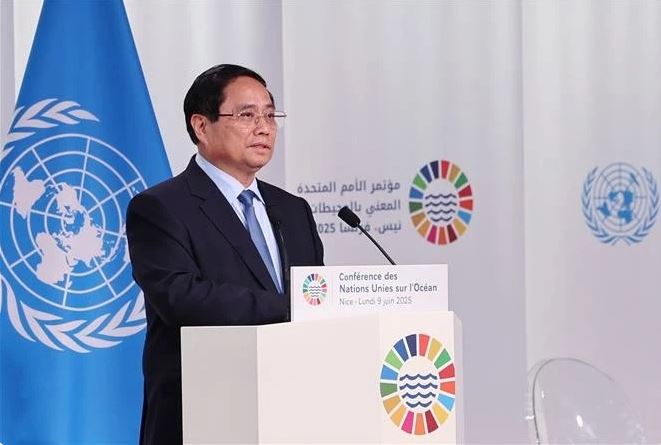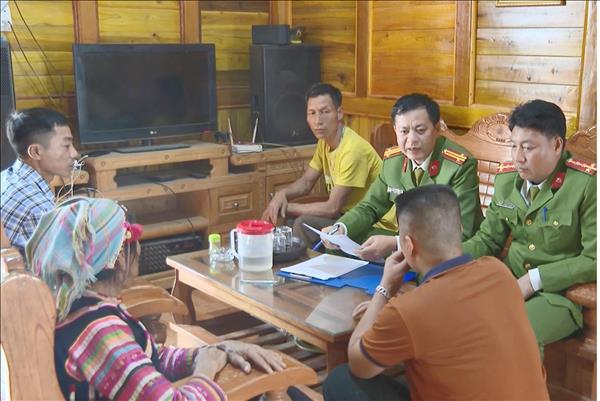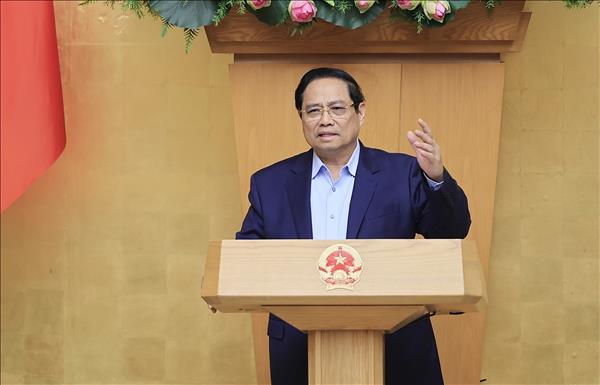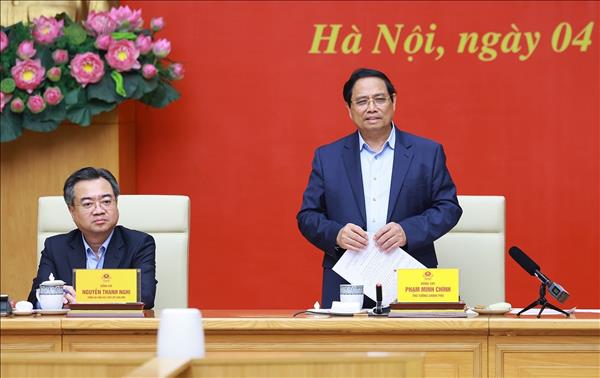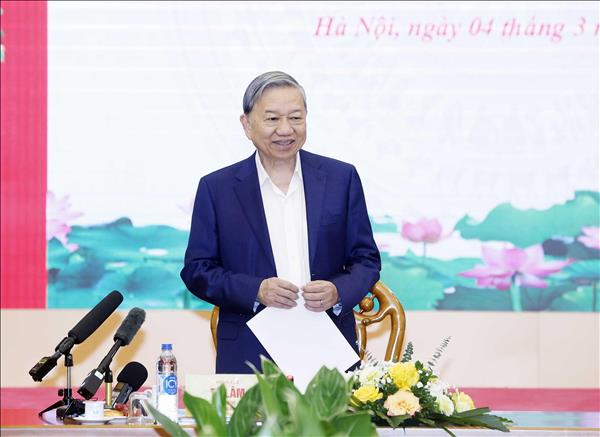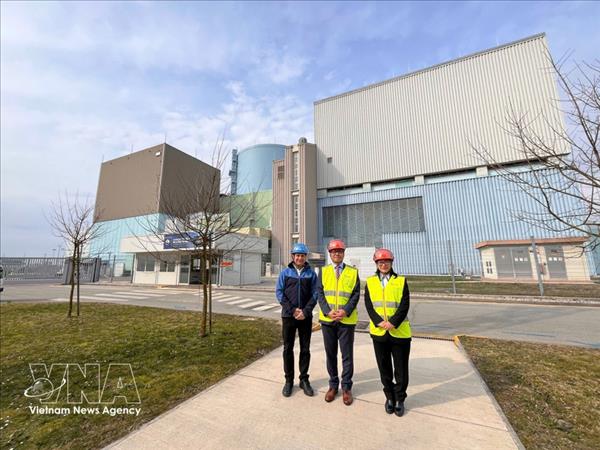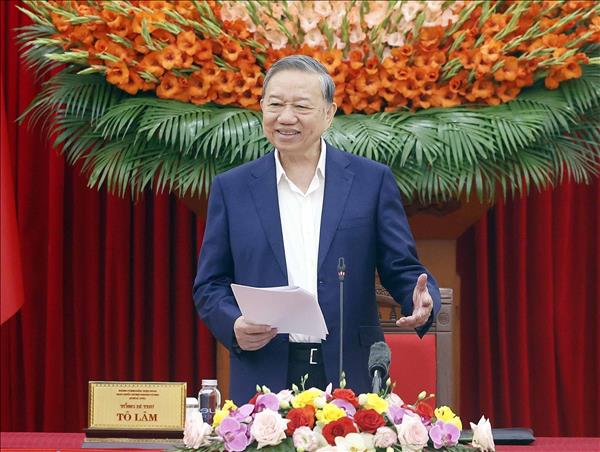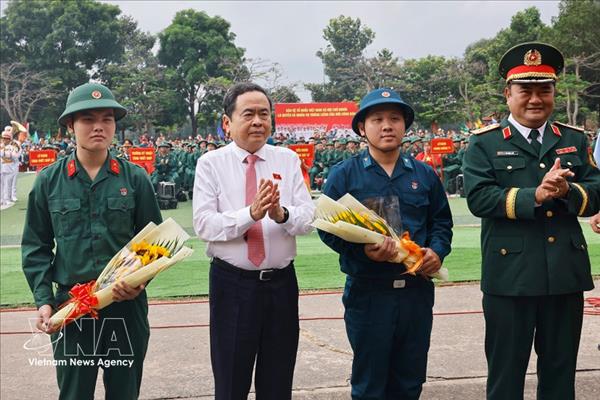Prime Minister Pham Minh Chinh has reaffirmed ASEAN’s position that upholds the values of the 1982 United Nations Convention on the Law of the Sea (UNCLOS) – the “Constitution of the Oceans” – and its implementing agreements, as the comprehensive legal framework governing all activities in the oceans and seas.
Presenting a keynote speech on behalf of the 10 member countries of the Association of Southeast Asian Nations (ASEAN) at the plenary session of the 3rd United Nations Ocean Conference (UNOC 3) in Nice, France, the PM emphasised ASEAN’s vital geographical position, which has for generations been at the heart of a maritime Asia—a convergence point of trade flows, cultures, and cooperation for centuries.
The East Sea (or South China Sea) in particular is one of the world’s most strategically significant maritime areas, hosting critical shipping lanes, rich marine ecosystems, and serving as a source of livelihood, cultural identity, and security for hundreds of millions of people, he stated.
However, he noted that like many other regions across the globe, ASEAN's seas are facing serious challenges. Climate change, sea level rise, biodiversity loss, marine pollution, overfishing, and escalating geopolitical tensions are gradually undermining ocean health and eroding trust among nations.
To address these emerging challenges, PM Chinh outlined four priority orientations shared by ASEAN nations. First, the oceans must always be preserved as a space of peace, development cooperation, and shared responsibility. Second, it is essential to promote a consistent global approach and regional efforts in ocean and maritime governance. Third, oceans and seas should be defined as a core driver of prosperous development. Fourth, there is a need to enhance global ocean governance based on cooperation rather than competition, to accelerate the achievement of Sustainable Development Goal (SDG) 14.
He also expressed ASEAN’s hope that UNOC 3 will inspire solidarity with strong commitments and foster strategic partnerships as a catalyst for transformative actions towards blue oceans.
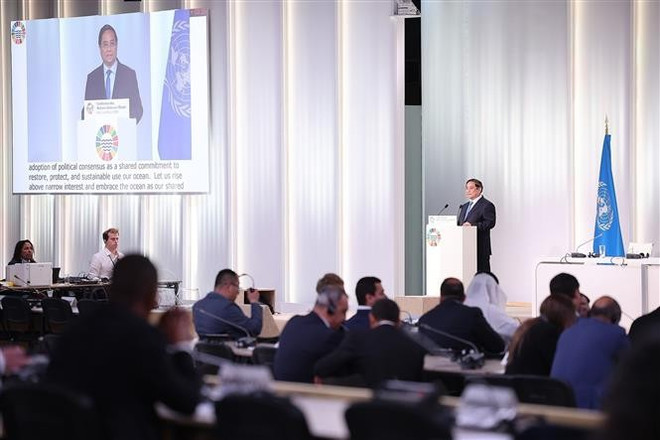
In a follow-up speech representing Vietnam, PM Chinh presented a paradox and a serious warning: although oceans and seas cover more than 70% of the Earth's surface and represent the largest ecosystem of the “Blue Planet”, SDG 14 on conserving and sustainably using oceans is the least funded among the 17 UN Sustainable Development Goals.
The PM called on the international community to act faster, more strongly, and more decisively and to gather joint efforts by countries, regions, and the whole world in preserving and sustainably using the blue ocean.
To do this, he said, it is necessary to persistently and consistently apply a scientific and dialectical approach that is universal, comprehensive, and global; based on the principles of fairness, equality, inclusiveness, development cooperation, and harmonisation of interests; through specific mechanisms, policies, solutions, and actions.
The Vietnamese leader also proposed six focal orientations: using scientific foundations combined with folk experience in policy making; promoting science, technology, innovation, and digital transformation to create new momentum for sustainable marine economy development; unlocking, mobilising, and effectively using resources for marine economy development; adopting a comprehensive and multi-sectoral approach in marine and ocean development governance; promoting inter-regional, inter-national, inter-continental connectivity to form a network of regional and global blue economic centres; and upholding solidarity and international cooperation in the conservation and sustainable development of seas and oceans.
Reaffirming Vietnam's consistent stance of being a friend and a reliable, active and responsible partner of the international community, PM Chinh emphasised that the country has been working with partners to take comprehensive and strong actions at many different levels of measures to realise the goal of conserving and sustainably using the marine environment (SDG 14) in the spirit of "three proactive": proactively implementing policies and programmes to develop blue economic sectors and restore marine ecosystems; proactively promoting cooperation and partnerships with countries, international organisations, and relevant parties, especially in knowledge sharing and technology transfer; and proactively proposing and actively participating in and implementing initiatives at national, regional, and global levels.
At the conference, the PM announced that Vietnam has registered 15 voluntary commitments in various fields of sea and ocean governance.
Concluding his speech, he appealed to all to act together and be united, responsible, proactive, and creative so that the ocean will forever be a space of peace, cooperation, development, and prosperity for today's and future generations./.


